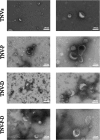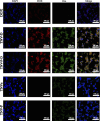Functionalized turmeric nanovesicles for precision delivery of doxorubicin in colorectal carcinoma treatment
- PMID: 40520210
- PMCID: PMC12162503
- DOI: 10.3389/fphar.2025.1587560
Functionalized turmeric nanovesicles for precision delivery of doxorubicin in colorectal carcinoma treatment
Abstract
Nanoscale vesicles have emerged as promising biocompatible vehicles for precision drug delivery, owing to their inherent therapeutic properties and versatile structural configurations. This study introduces an innovative biomanufacturing strategy utilizing curcumin-extracted nanovesicles (TNVs) conjugated with a cancer-selective peptide and encapsulated with doxorubicin to optimize therapeutic outcomes in colorectal malignancies. TNVs were purified through refined ultracentrifugation protocols, demonstrating uniform saucer-shaped morphology with an average size of 162.42 ± 3.67 nm and stable bilayer architecture dominated by triglyceride (30%) and ceramide (11.8%) constituents. Peptide-mediated surface functionalization substantially improved intracellular internalization efficiency in HCT-116 colon carcinoma models. The engineered TNV-P-D formulation exhibited potent tumoricidal activity (IC50 = 54.8 μg/ mL), outperforming both unbound doxorubicin (IC50 = 795.2 ng/mL) and nonfunctionalized TNV-DOX counterparts (IC50 = 129.7 μg/mL). Cell cycle profiling revealed G1-phase blockade (91.3% G1-phase occupancy), corroborating the platform's proliferation-inhibiting capacity. In murine CT26. WT xenograft models, TNV-P-D administration achieved significant tumor regression (65% volume reduction, p< 0.001) while preserving hepatobiliary function and demonstrating negligible multiorgan toxicity. These results position peptide-augmented phytovesicles as a multifunctional therapeutic system capable of dual-action tumor targeting and systemic toxicity mitigation in colorectal oncology.
Keywords: biocompatible chemotherapy; colorectal carcinoma; drug encapsulation; tumor-homing peptide; turmeric nanocarriers.
Copyright © 2025 Meng, Yi, Duan, Mahal, Zhang, Ren, Chen, Yang, Xu, Obaidullah, Song, Li and Wang.
Conflict of interest statement
Author AM was employed by Guangzhou HC Pharmaceutical Co. The remaining authors declare that the research was conducted in the absence of any commercial or financial relationships that could be construed as a potential conflict of interest.
Figures












References
-
- Alvarado-Noguez M. L., Rojas-Franco P., Cano-Europa E., Franco-Colín M., Hernández-Aguilar C., Domínguez-Pacheco F. A., et al. (2018). Curcuma longa treatment effect on blood samples of rat with hepatic damage: a photoacoustic spectroscopy application. Int. J. Thermophys. 39, 105. 10.1007/s10765-018-2421-0 - DOI
LinkOut - more resources
Full Text Sources

